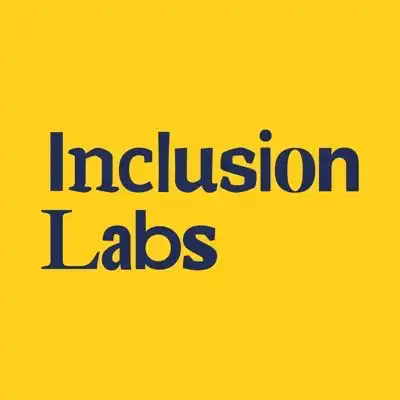Investing in...
Your social mission.
What makes you different.
Growing your organisation.
What makes you different.
Growing your organisation.

We provide investment for early stage, growing organisations. Our investment is made for organisations that are
Committed to improving their team's diversity
Looking to grow their trading income
Tackling inequity in the UK
We offer between £50,000 and £1,500,000 of investment. There are three flexible investment types aimed to meet your needs
Equity
Shares in your organisation
£50,000 to £500,000
Revenue Share
Repayments based on your organisation's revenue performance
£50,000 to £750,000
Patient Debt
Regular repayments set at an agreed interest rate over several years
£500,000 to £1,500,000
Our approach
We're here to make investment better for organisations. We don't discriminate based on who you are or where you come from. We'll be open and honest with you from the beginning, and we'll do our best to adapt to your needs every step of the way. That's our commitment to you.
Support before investment
Up to £15,000 of grant funding providing your organisation with support before accessing investment or to cover your personal expenses through the process.
Dedicated portfolio manager to support you through each step of our investment process.
Access to our investment templates and resources to guide you and give you transparency across the process.
Support alongside investment
Up to £20,000 grant as additional funding support to help you grow your organisation.
Continued 1 to 1 support from a portfolio manager to help you achieve your growth ambitions.
Access to our professional network, alumni, and opportunities for follow on funding and support to continue your growth.
We've invested in

Neuropool
£300,000 / Equity
Apr 2023

DWRM
£150,000 / Revenue Share
Jun 2023

Harry Specters
£259,481.59 / Revenue Share
Sep 2023

Lightning Reach
£250,000 / Revenue Share
Sep 2023

Inclusion Labs
£200,000 / Equity
Dec 2023

Generation Success
£120,000 / Equity
Dec 2023

Genius Within
£500,000 / Patient Debt
Feb 2024

Living in Fitness
£55,000 / Revenue Share
Apr 2024
Want to learn more about investment?
Frequently asked questions
-
The Growth Impact Fund provides social investment for early stage, growing social purpose organisations. Investment is made to organisations that are:
- Led by diverse leaders and teams.
- Looking to grow their trading income.
- Committed to helping tackle inequality.
-
The fund hopes to tackle the structural barriers to social investment, as highlighted by the Adebowale Commission, which found that despite £600m of public investment since 2010, the social investment market remained unchanged. In the first 5 years, we hope that:
- 120 Social Purpose Organisations can access support and we hope to make 50-60 investments. We anticipate this averaging out to between 10 - 15 investments a year (depending on size).
- 480,000 people per year can benefit from the Social Purpose Organisations that we support
- Social Investment market changes as a result, and we will be sharing our learnings from the fund publicly through our blog and wider publications to support this.
-
The fund is backed by major partners Bank of America and Access - the Foundation for Social Investment, in addition to Big Society Capital, Greater Manchester Combined Authority, the University of Edinburgh, Scope, Trust for London, Joseph Rowntree Foundation, Charities Trust, Barrow Cadbury Trust and Nick Marple, the renowned philanthropist.
-
The Growth Impact Fund is designed to be evergreen, meaning it aims to be self-sustaining and ongoing, with no defined end date.
-
To be eligible for the Growth Impact Fund, your business must be:
- Registered in the UK as a Company Limited by Shares (CLS), Limited By Guarantee (CLG), CIC, or a registered charity
- Have demonstrated proof of concept by generating some trading revenue already.
- Are looking to significantly grow trading income and social impact.
- Are interested in seeking funding as a repayable investment.
And your team must be diverse, by which we mean that >75% of your board and >50% of your senior management team should identify as at least one of the following:
- women
- disabled
- From a 'racialised community', including Black, Asian, from a minority ethnic background, or from a Gypsy, Roma or traveller background
- LGBTQIA+
- have direct lived experience of the social issues you are addressing
- have experienced socio-economic disadvantage.
We may also invest in your organisation if you or your team don't identify with the above characteristics, but can demonstrate a clear commitment to improving diversity, equity and inclusion in your business.
-
The Growth Impact Fund was designed to do things differently. We support social purpose organisations by offering both financial and practical business assistance.
-
We offer investment between £50k- £1.5 million in a flexible way which can take the form of:
- EquityWe invest in your business in exchange for a share of ownership in the company. This could be right for you if you're looking for exponential growth and a long-term partner. Equity Range: Between £50k and £500k.
- Revenue shareWe invest in your business and get repaid based on a percentage of your revenue that gets paid back to us. We also offer flexible financing for those with CLG structures and where debt isn't suitable. Revenue Share Range: Between £50k and £750k
- Patient debtLong-term loan with the expectation of repayment with interest. We invest in your business and get repaid based on a fixed repayment. Debt Range: £500k up; targeting £750k
-
Equity is money that is invested in a company in exchange for shares. The company is valued and the investor is given dividends according to their ownership % in that company and the capital that has been gained or lost as part of that investment. Social purpose organisations must be a CIC limited by shares or a CLS to qualify for this type of investment.
-
The average equity investment will be £200,000 for early stage organisations and £600,000 for later stage ones. UnLtd & BII will take an average stake of 15-25% in a business, but this could be less, or more. All equity will be bespoke to suit the needs of the individual business - there will not be a 'one size fits all' calculation.
-
Equity is well suited to businesses who cannot afford regular repayments due to an irregular cash flow. It is less common for early stage businesses in the UK investment market as it is more risky than debt finance as the investor doesn't know when they will get a return.
-
When an investor lends money to an organisation with the expectation that the borrower pays back this money with interest. Debt finance is what the Impact Fund & Thrive Fund offered.
-
The average debt investment will be £750,000. The average interest rate will be 10% with a repayment term of 7 years. Debt investment is suitable for any legal structure.
-
An RPA is an unsecured loan where interest payments are determined by the revenue performance of the organisation. If the company expands its revenue, the Fund shares in that and takes a pre-agreed % of revenue. If the company doesn't perform, our interest payments fall in line with revenue and organisations pays little or no interest.
-
The average size of investment will be £150,000 for early stage businesses and £450,000 for later stage ones. On average, UnLtd & BII will take 5% of a business' revenue over an 8 year period. We will cap the amount we take so it is not disproportionate to the investment size. This investment type is suitable for any legal structure.
-
Anyone is interested in applying for investment or pre-investment grant support should complete the form on the Growth Impact Fund website.
-
We also acknowledge some Social purpose organisations are looking for additional funding and development support before looking to raise finance. As a result, we also offer:
- Up to £15,000 of grant funding to cover additional support and personal expenses.
- The grants can be used for business costs e.g., consultancy costs, marketing costs, social impact support costs, IT systems etc.
- Personal costs could include a salary for the entrepreneur or a team member, care costs, travel, translation costs etc.
Everyone we work with also has access to our social investment templates and resources to help guide them and provide transparency across the process.
-
We use the term 'racialised communities' as opposed to BAME (Black Asian and Minority Ethnic). We think that BAME ignores the full spectrum of ethnicities and cultural identities, implying that everyone that falls within this term is the same. 'Racialised' doesn't define the community or the identity, but rather the phenomenon that has happened to them.